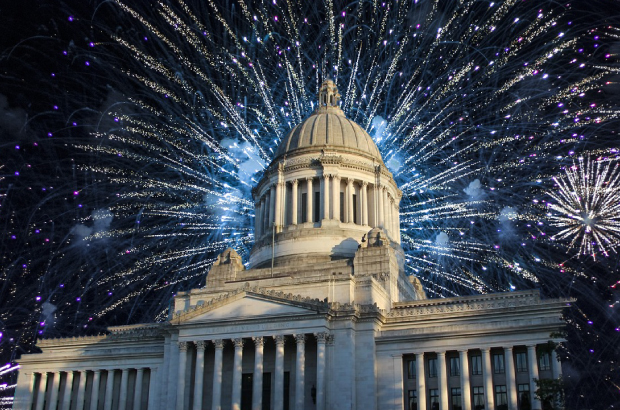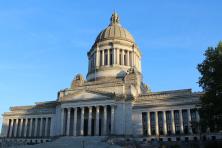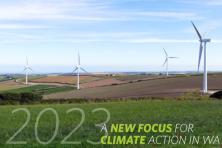When I began working at Climate Solutions just over six years ago, Washington’s strongest climate policy was a 15% Renewable Portfolio Standard—a requirement that a portion of the state's electricity be generated by renewable energy. That’s difficult to imagine now, given that Washington now has one of the most ambitious climate policy frameworks in the nation: the Clean Energy Transformation Act, the Clean Fuel Standard, the Climate Commitment Act, and many others. Washington has truly become a national leader on climate!
We already knew this year would be different than previous years in how we are engaging with clean energy policies. Instead of focusing on whether we’ll reduce emissions, we have shifted our attention to how we’ll reduce emissions and who will benefit in the transition.
The 2023 climate wins recognize this shift. It has been two years since the passage of the Climate Commitment Act, which created an enormous opportunity to invest BILLIONS of dollars in clean energy solutions and healthier communities. Creating new clean energy programs with Climate Commitment Act dollars was a top priority this session; we saw tremendous progress towards making clean energy accessible to all, improving air quality in overburdened communities, facilitating the creation of jobs through improvements to the process for building clean energy projects, and changing land-use and zoning requirements to incorporate climate concerns. It is incredibly exciting that Washingtonians across the state are on the brink of seeing and feeling the benefits of our clean energy laws.
There are also a few policies the Legislature left on the table. Below is a summary of what happened on climate this year!
2023 Climate Wins!
Clean Transportation: bringing zero-emission medium- and heavy-duty vehicles to communities statewide
Following huge strides to accelerate clean transportation over the past few years, this year’s budget allocations from the Climate Commitment Act prioritized cleaning up the dirtiest vehicles on our roads: medium- and heavy-duty vehicles like trucks, buses, and vans. Climate pollution from these vehicles has more than doubled since 1990, so this is a critical sector of emissions to address. Communities will soon see less pollution and improved health outcomes in their neighborhoods thanks to a $120 million incentive program to fund zero-emission medium- and heavy-duty vehicles and associated charging infrastructure for businesses, schools, transit agencies, local governments, independent owner-operators, and others. Additionally, drayage or short-haul trucks were a priority for improving air quality in communities close to busy ports, with a new $6.3 million port drayage pilot project to help get clean trucks on the road. As a bike commuter who rides alongside the Port of Seattle, I’m also excited to breathe easier when I’m following these large vehicles on the road.
Clean buildings: increasing access to cleaner, more efficient homes and buildings
Washington’s homes and buildings are still the fastest growing source of emissions statewide, and gas use in homes and buildings has significant climate and health impacts—one of eight childhood asthma cases are directly linked to the use of gas appliances indoors. Recognizing these impacts, the Legislature put $80 million towards a program subsidizing heat pumps and other efficient electric appliances that prioritizes low- and moderate- income households, adult family homes, and small businesses. Paired with $40 million in funding for weatherization and energy efficiency projects, this is super exciting! It will enable families to transition off gas who may not otherwise be able to afford it. These programs are in addition to the $83 million in federal funding coming to Washington for heat pumps; money should no longer be a barrier to electrifying homes and buildings all across Washington.
Air quality: a promising start toward improving air quality and health disparities in overburdened communities
A central goal of Washington’s climate policies is to cut statewide climate pollution, but equally important is addressing local air pollution that is often concentrated in low-income, Black, and Indigenous neighborhoods, as well as in other communities of color due to racist housing policies such as redlining. The Legislature dedicated $11.4 million to help Ecology create a new grant program to address communities' major sources of air pollution, $10 million to expanding Ecology's air quality monitoring network, $38 million for a Department of Health program that funds community-led solutions to climate impacts and health disparities in overburdened communities, and $42.8 million for capacity grants to support Tribes and overburdened communities in engaging with policy implementation.
Siting: bringing clean energy projects and jobs to our state
Headed to the Governor’s desk is a precedent-setting bill that will bring more clean energy and jobs to the state. HB 1216 will holistically improve siting of new clean-energy projects by investing in upfront analysis and planning, better coordinating the permitting process, and expanding state capacity to review projects, while building in more opportunities for Tribal consultation and thorough engagement with overburdened communities. This holistic approach to improving clean energy siting is a critical piece of the climate puzzle, and the product of extensive collaboration between legislators, state agencies, Tribal representatives, environmental organizations, labor representatives, utilities, and project developers.
Utility shut-off prohibition: ensuring everyone remains connected to critical utilities during heat waves
Washington continues to experience increasing summer temperatures and heat waves, and households must remain connected to their essential utilities during extreme heat for their health and safety—it's a matter of climate justice. HB 1329 prevents electric and water utilities from terminating service to residential customers and tenants during National Weather Service high-heat alerts. Washington currently has a seasonal winter moratorium on utility shutoff (including for gas utilities) but only for low-income customers. We supported the passage of this bill but will advocate that the Legislature go further by implementing a seasonal summer moratorium with greater protections.
Land-use: incorporating climate into local planning and ending single-family zoning
To echo Climate Solutions alumnus K.C. Golden, “Housing solutions are climate solutions.” Sprawl destroys our natural lands and leads to carbon-spewing commutes so it is important to ensure people can live near work, essential services, and community activities. Providing enough housing, rather than artificially limiting it, will also help address our mounting housing crisis. The Legislature took a big step forward this session with the passage of HB 1110. Jurisdictions across Washington are now required to allow more housing, depending on the size of the jurisdiction; larger ones must allow at least four units per lot—or six, if within a quarter mile of transit—and smaller ones must allow at least two. The Legislature also finally passed HB 1181, which updates the Growth Management Act so jurisdictions must plan for climate impacts and for more sustainable development. These bills together mark significant progress on local land-use planning and zoning that have major climate implications!
Where the Legislature fell short:
Future of gas utilities: requiring Washington’s largest utility to invest in the clean energy future
Puget Sound Energy (PSE) is Washington’s largest gas and electric utility and a major source of climate pollution. PSE recognizes the need for additional policy direction and brought forward HB 1589 – a bill that would have required the utility to proactively plan to achieve Washington’s climate targets and make building electrification more affordable by investing hundreds of millions of dollars in incentive programs. We appreciate PSE’s leadership on this bill and look forward to working with legislators and stakeholders in the interim to refine it for next year.
Clean Energy Navigator: ensuring communities can access clean building incentive programs
There are billions of dollars coming to Washington for climate and clean energy (yay!) and it’s critical that communities understand how to access the incentives available to them. The Clean Energy Navigator bill would have established a program to make sure that households, small commercial building owners, tenants, and others understand available clean energy programs and energy audit services. The program would help consumers and businesses to identify contractors and secure financing, and would ensure strong outreach and education for communities across Washington. Legislators partially recognized the urgency of this and allocated $250,000 towards a process to convene stakeholders and start planning for a program to assist communities in accessing these programs.
Zero-emission school buses: requiring cleaner buses to drive our communities and kids
HB 1368 would have established a timeline for purchasing zero-emission school buses, ensuring a quick transition to vehicles that won’t harm our kids’ lungs. While this bill didn’t move forward, we look forward to working on it next session in a new form. After all, part of the bill – establishing a grant program for zero-emission school buses – was funded via the budget!





